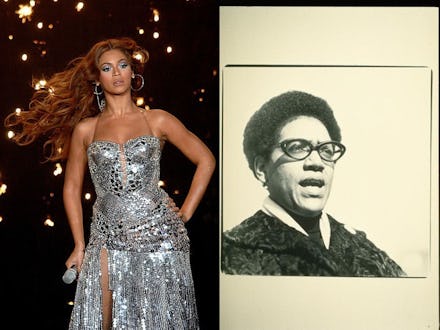Why Audre Lorde Fans Can Love Beyoncé, Too

Confession: I'm obsessed with celebrities. Specifically, strong-minded female celebrities who talk about female empowerment.
When I was 12, "Can't Hold Us Down" and "Fighter" made me fall in love with Christina Aguilera. Fast-forward 10 years later and I've grown to love other celebrities— Beyoncé, Rihanna, Tina Fey, Jennifer Lawrence, Lorde — who talk openly about female strength.Yes, even Miley Cyrus. I've got Miley's back any time of day.
Not everyone adores these women the way that I do, but that hasn't stopped the recent surge of think pieces on feminism and empowerment inspired by female celebrities. The New Republic called Beyoncé's latest (and very unexpected) album "a feminist manifesto"; PolicyMic's own Elizabeth Plank placed celebrity-related moments in the first four spots of "28 Most Iconic Feminist Moments of 2013."
Let's just say 2013 was the year when celebrities and feminism went hand-in-hand.
Lately, though, I've been struggling to answer whether this is the focus that my feminism should take.
Why look up to Miley Cyrus when there's Judith Butler? Why look up to Rihanna when there's bell hooks? Why look up to Beyoncé when I've got Audre Lorde?
When I shared Elizabeth Plank's article on 2013 iconic feminist moments on Facebook and Twitter, I can't count the number of friends who immediately voiced their concerns:
"Why are the first four feminist moments celebrity-focused?"
"Why is Beyoncé the thumbnail for this?"
"Why are Beyoncé or Jennifer Lawrence even on this list?"
As much as I loved the article, their questions were valid. After all, before Jennifer Lawrence said, "Go f**k yourself" to people who told her to diet, we had fat-positive feminism. Is Beyoncé coming out as a feminist really that iconic of a feminist moment? Why are celebrities at the forefront of our discussions of feminism?
The question isn't too hard to answer. After all, academics don't get as much love or recognition as celebrities right off the bat. They don't do as well on search engines. News about them doesn't go as viral on social media. (At least, not generally — search #NotYourAsianSidekick on Twitter, which was originally created to drive a conversation on Asian-American feminism).
Recently, Cosmopolitan editor-in-chief Joanna Coles took a jab at academic feminists, saying:
What I think of as classic, mainstream feminism has been hijacked by the campuses across America and made to feel too self-referential and really not that relevant to women who actually need to fight for their rights at the moment.
Yes, Miley Cyrus and Beyoncé are self-proclaimed feminists. No one can deny that Beyoncé's latest album makes powerful feminist points, just as no one can deny that Beyoncé is extremely culturally relevant right now.
My concern is that many millennials may start to ONLY think about feminism due to its celebrity caché. Moreover, these celebrities may use the "feminist brand" simply to market themselves to a new audience. After all, Beyoncé hesitated at first to call herself a feminist; Miley only came out and called herself one after Annie Lennox and Sinead O'Connor all but implied that she was a slave to sexual objectification.
Still, why create what may well be a false dichotomy between celebrity feminists and academic feminists? After all, Beyoncé's very latest album included the following audio samples from a Nigerian feminist, Chimimanda Ngozi Adichie.
Feminist: a person who believes in the social, political, economic equality of the sexes.We teach girls to shrink themselves, to make themselves smaller. We say to girls, you can have ambition, but not too much. You should aim to be successful, but not too successful. Otherwise, you would threaten the man.
These audio samples went viral, making their way across the globe from NYC to London to Istanbul.
Watch Adichie's TED Talk below. (Or bookmark it for later).
Is Beyoncé truly embracing feminism? Or is it a PR stunt?
There are a million reasons to debate either argument, but the important point is, millions of Beyoncé fans heard Adichie's ideas. That's what matters.
Similarly, Miley's tweet on the "Free the Nipple Campaign" has recently spurred enormous media coverage.
While, sadly, the media coverage has focused a great deal on Miley herself, I'm happy for any exposure that feminist measures can get. (Yes, toplessness laws are a feminist issue.) Even if Miley Cyrus supports freeing the nipples as a PR move, her Tweet still expanded the reach of these causes. More media exposure means more young people will learn about these causes.
After all, we should all be able to interact with feminism or feminist ideas in our own ways. Not everyone likes to sit down and read Judith Butler's extraordinarily convoluted writing style. Not everyone has access to the intellectual havens where many of these academic feminists make their marks.
While the internet has certainly democratized discussions about feminism, not everyone is tapped into the feminist blogosphere. Sometimes, hearing it first in a song on Spotify or on iTunes, or hearing a celebrity support feminism is what works for many of our generation.
via Tumblr
And that's okay — to each their own on how to learn about feminism, and from where to draw feminist influences. All I ask is that we simply remember that for every celebrity that speaks out on women's empowerment, on body image, or on equality, there are probably already five other feminists in the shadows who've spent their lives writing about those ideas.
Feminism comes in many forms: Let's show our love for Audre Lorde, Andrea Dworkin, and Chimimanda Adichie as much as we celebrate Beyoncé.